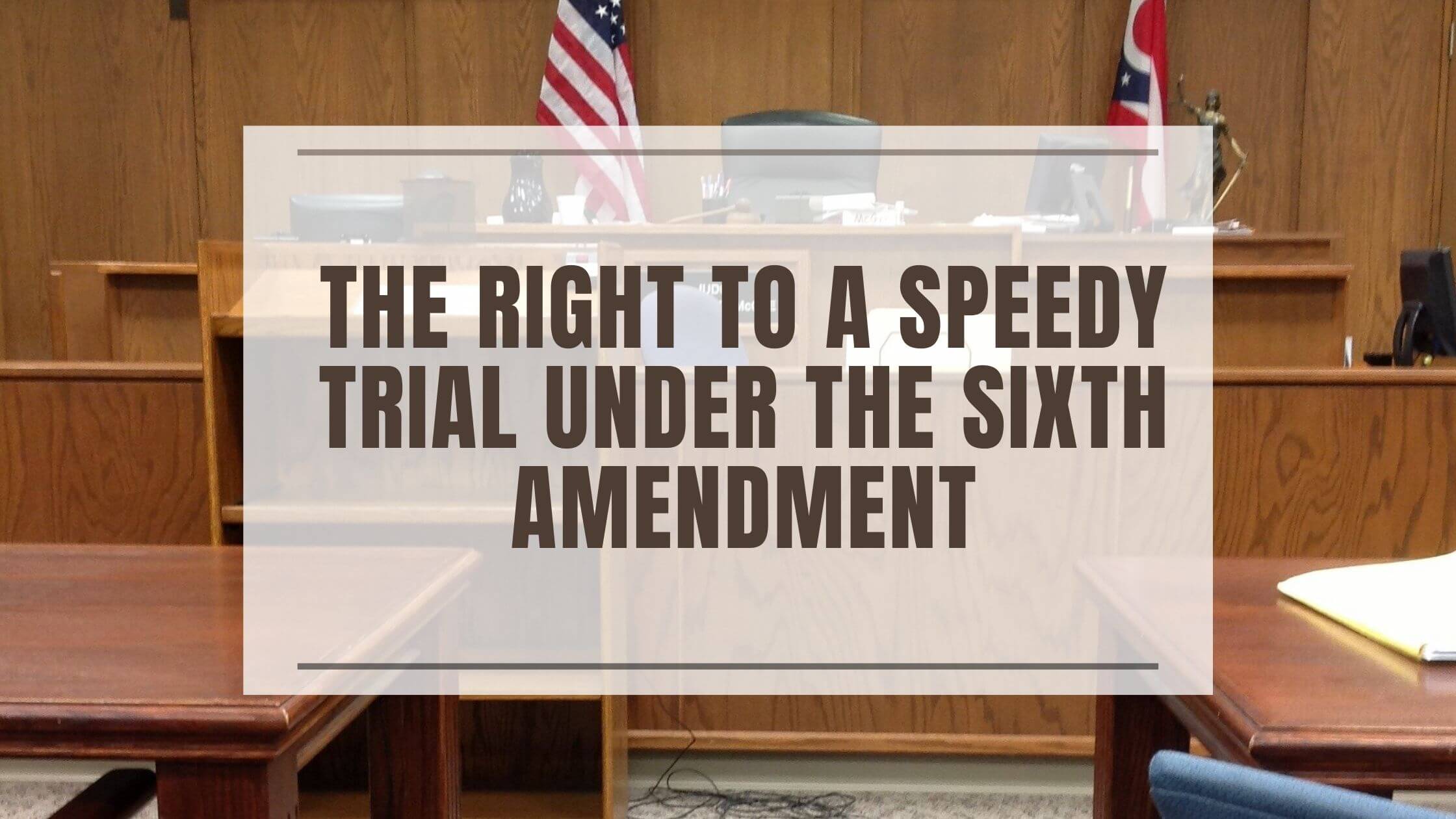Table of Contents
ToggleYour Right to a Speedy Trial
The fifth, sixth, seventh, and eighth amendments of the United States Constitution all deal with the rights of people accused or convicted of crimes. These amendments give people the right to a fair trial, forbid cruel and unusual punishment, and require a trial to happen quickly.
What exactly does it mean that everyone has a constitutional right to a speedy trial in the United States? How do judges determine whether or not a prosecution happened quickly enough? People often win or lose cases based on the argument that they were not given a speedy trial.
The reason for the delay matters as much as the length of the delay. If the trial was delayed on unreasonable grounds, the case may be thrown out.
Where in the Constitution is the Right to a Quick Trial Stipulated?
The sixth amendment explicitly states that a trial has to happen quickly. It says that “the accused shall enjoy the right to a speedy and public trial, by an impartial jury.” As a trial cannot be unreasonably delayed, charges may have to be dropped if a suspect argues that their sixth amendment rights were violated.
The 6th amendment is contained within the Bill of Rights rather than the original constitution. It is a series of amendments that protect people from the state, including unjust laws. The Bill of Rights (1791) includes some of the most famous elements of the constitution, including freedom of speech and the right to bear arms.
Trials Were Less Professional in the Past
Trials in the eighteenth century were very different from their modern day equivalent. They were much shorter and often had the accusers and accused representing themselves instead of availing of legal counsel.

Participants argued their cases and called witnesses. Sometimes, proceedings were completed in a few hours or even minutes. Long and formal modern trials slowly replaced these.
Since the Bill of Rights was written when trials were less complicated than they are today, a “speedy trial” might not mean the same as it did at the time. However, an accused criminal can still walk free if they have a strong argument that their trial was unjustly delayed.
What Makes a Trial Count as Speedy?
A criminal case cannot always be brought to a conclusion quickly. Often, it takes considerable time to gather all of the evidence, witnesses, and legal professionals that will appear in court. Whether or not a trial was speedy is subjective and depends on the case’s specific circumstances.
However, some states have a time limit. In Colorado, a trial must be held within six months of someone pleading not guilty. Depending on the state, the time limit can either be several months or subjective.
Six Months is Not an Exact Time Limit
Some exceptions make it acceptable to have a trial more than six months after the not guilty plea in Colorado. If the defense or the prosecution needs even more time than that to gather evidence and witnesses, the trial can be postponed.
Colorado also allows a trial to be delayed by more than six months if it is a mistrial or if the defendant cannot appear on that date. In other words, judges do not decide whether or not sixth amendment rights were violated based on how many months it took to bring the case to trial.
What Else Determines if a Trial Was Unjustly Delayed?
If the basis for the delay was reasonable, the accused can’t claim their rights were denied. If there is something malicious about why their trial was delayed, they can win their case.
A trial could have been delayed deliberately as a strategy by the opposing legal team. A trial can also be delayed due to negligence. These are reasons to dismiss a case.
How long the delay was is also relevant, as is whether or not the delay weakened the defense in any way. If a defendant wants to make a speedy trial case, their best chance is to repeatedly point out how long the case is taking early on.
Why Does the Constitution Require a Speedy Trial?
Firstly, worrying about the verdict of a case is incredibly stressful. Anyone who has been in legal trouble before knows that it is exhausting. Someone charged with a crime, especially if innocent, deserves to have the trial over with quickly.

Being in legal trouble can cause other problems besides stress and anxiety. Friends, spouses, parents, children, and sometimes employer can find out about such legal issues. A person’s relationships can be detrimentally affected by being taken to court.
Imprisonment While Awaiting Trial
Waiting for a trial is similar to punishment, especially in cases where the accused is subject to pretrial confinement. Frequently, after a criminal charge has been made, the accused has to be kept in jail for the safety of others.
However, it is unethical to keep a potentially innocent person in jail for a protracted period. A trial must be reasonably quick so that an innocent defendant can be released from custody and return to everyday life.
It May Be Harder to Prove Guilt or Innocence Years Later
It may also be more difficult to locate witnesses a year rather than a month after a crime was committed. After a lengthy delay, witnesses may not remember events as clearly and offer conflicting testimony. Also, physical evidence can have a limited lifespan.
Many parts of the Bill of Rights say that the law has to be fair – the juries must be impartial, that trials must be public, that punishments cannot be too cruel. These constitutional amendments even forbid exorbitant fines. Making it illegal to excessively delay a trial is congruent with the rest of what the constitution says about criminal justice.
What Can a Victim of a Delayed Trial Do?
A victim of a delayed trial might, at best, have all of their charges dropped. People often escape conviction if the case is thrown out because their rights were infringed upon. Usually, prosecutors are not allowed to re-file the charges.
Even in a state with a clear deadline, such as six months in Colorado, it can be tricky to win a case. If someone can point to a clear deadline before the trial occurred, they may have a chance.
Opposing counsel will argue that they had a legitimate reason to delay the trial. However, lawyers can argue that the prosecution found evidence slowly for no good reason and that the trial was unjustly delayed.
Statutes of Limitation Also Prevent Justice From Being Delayed
It is not always possible to charge someone with a crime that happened many years ago. Each crime has a statute of limitations, and if the person is not charged before it runs out, they cannot be indicted. This means that there is a limit on how long the prosecution can gather witnesses and evidence.

The statute of limitations for different crimes varies, with more serious crimes having a longer time limit. For some serious crimes, there is no statute of limitations. It is not unusual for and individual to be convicted of a murder that happened decades ago, for example.
Do People Get Away With Crimes Because of These Time Limits?
These laws may be too lenient on some offenders. For instance, while Florida has no statute of limitations for felonies that might lead to a life sentence, second-degree murder has a maximum sentence of thirty years. A murderer could get escape justice because the statute of limitations ran out for that crime.
Usually, second-degree murder has no statute of limitations. Other violent crimes like kidnapping often have no statute of limitations.
The point of these time limits is that evidence may be lost, and people may not accurately remember events that happened so long ago. A trial that happens a decade later may not be fair. This is balanced against the argument that a very serious crime should be punished no matter when it was committed.
Speedy Trial Rights are Not the Same
The right to a speedy trial applies to the time between the beginning of criminal proceedings and the trial. This is different from statutes of limitations. They forbid an excessive delay between when the criminal offense was committed and when charges are filed.

Get Smarter on US News, History, and the Constitution
Join the thousands of fellow patriots who rely on our 5-minute newsletter to stay informed on the key events and trends that shaped our nation's past and continue to shape its present.
Is the Right to a Speedy Trial Also to Protect Victims?
The right to a speedy trial only protects people accused of crimes, not the victims of crimes. The victim of a crime may want the trial to happen sooner rather than later.
However, they cannot insist on a quick criminal trial and say that it is legally necessary. The 6th amendment of the United States Constitution does not allow the victim to insist on a speedy trial.
Can Victims Insist on a Quick Trial?
However, legislators have raised this issue, and some states now give victims the right to a speedy trial. When considering how long a trial can be delayed, the courts must consider whether it would hurt the victim to delay it.
Even if the defendant and prosecutor agree on a delay, the victim may have the right to a quick trial. Some states require courts to prioritize cases where children or elderly people are victims because a delayed trial can be more hurtful for these people.
Quick Trials Allow Courts to Move on to Other Important Cases
Another reason why trials have to happen quickly is that the courts can only deal with so many cases at a time. If one case drags on for too long, this can interfere with other cases being completed. A congested court system is a threat to justice.











